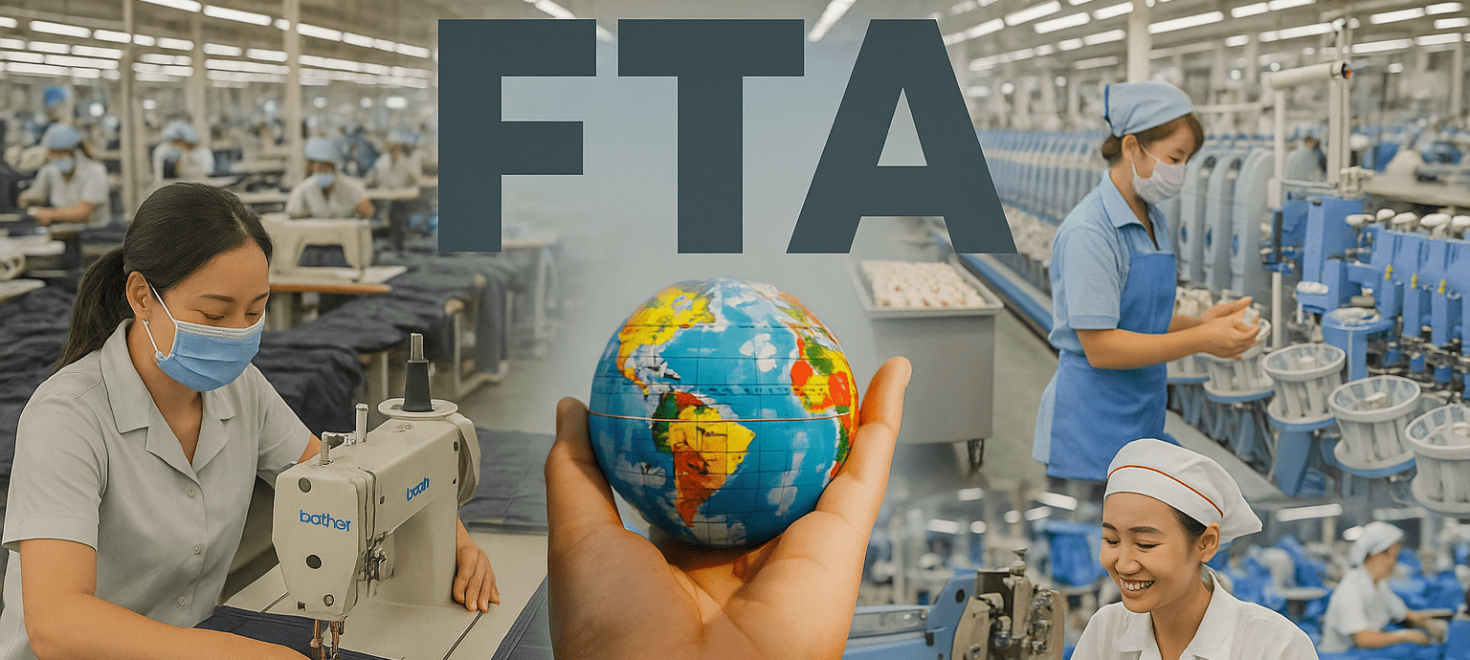Introduction
Over the past decade, Vietnam has emerged as a major player in the global apparel trade. With more than 6,000 garment and textile enterprises and export revenue exceeding $40 billion annually, Vietnam’s garment sector is not only a key economic driver but also a symbol of its successful integration into global supply chains. What has fueled this growth? A combination of competitive labor costs, investment-friendly policies, and most importantly, participation in comprehensive free trade agreements (FTAs).
Yet, this rise brings with it a new set of expectations. As buyers worldwide grow more conscious of how their products are made, issues of environmental sustainability and ethical labor practices have gained prominence. This shift requires Vietnamese manufacturers to operate at the intersection of speed and responsibility—delivering large volumes quickly while staying compliant with international standards.
The Strategic Role of FTAs
Vietnam’s proactive approach to joining trade pacts has greatly expanded its access to high-value markets. Through agreements like the EVFTA (with the European Union), CPTPP (with Pacific Rim countries), and RCEP (covering much of Asia), Vietnam has secured reduced tariffs, simplified market access, and increased foreign investment.
However, these agreements are not merely economic in nature. They include binding clauses on labor rights, environmental stewardship, and supply chain transparency. The shift from simply being a low-cost sourcing destination to a responsible manufacturing hub demands strategic adaptation by Vietnam’s garment industry.
EVFTA, CPTPP & RCEP: Benefits and Obligations
Each of these trade agreements offers a distinct set of benefits, alongside new responsibilities that reshape how Vietnamese garment manufacturers must operate.
The EVFTA (EU-Vietnam Free Trade Agreement) offers significant tariff reductions—up to 99% over a 10-year period—for qualifying Vietnamese exports to the EU. However, access to these benefits is conditional. Producers must comply with stringent rules of origin (particularly the “yarn-forward” rule) and meet EU-mandated sustainability standards concerning labor rights, carbon emissions, and waste management. These requirements demand comprehensive supply chain visibility and adherence to detailed documentation procedures.
The CPTPP (Comprehensive and Progressive Agreement for Trans-Pacific Partnership) expands Vietnam’s export potential to advanced markets such as Japan, Canada, and Australia. Beyond tariff benefits, the CPTPP mandates strict labor and environmental compliance measures. This includes provisions for collective bargaining rights, workplace safety, and environmental sustainability benchmarks. Unlike earlier trade pacts, CPTPP features enforceable dispute mechanisms, making non-compliance a serious liability.
The RCEP (Regional Comprehensive Economic Partnership) focuses on strengthening trade among ASEAN members and regional partners like China, South Korea, and Australia. While it lacks the rigorous labor and environmental clauses of the EVFTA or CPTPP, RCEP simplifies rules of origin and customs processes, promoting supply chain integration. It serves as a strategic advantage for Vietnamese manufacturers aiming to expand intra-Asia sourcing and production.
Collectively, these agreements have made Vietnam a preferred sourcing destination for global apparel brands seeking diversification from China. However, the competitive edge lies not merely in market access or lower tariffs, but in the ability of Vietnamese factories to respond to these pacts with agile, transparent, and compliant operations. Navigating this landscape requires not just operational efficiency, but a deep commitment to ESG principles and sustainable industrial practices.
Compliance Pressures on the Factory Floor
While FTAs provide competitive benefits, they also impose rigorous compliance expectations. Vietnamese manufacturers must demonstrate that they:
- Use sustainable raw materials and processes.
- Comply with the “yarn-forward” rule (i.e., raw materials must originate in Vietnam or the FTA member country).
- Uphold fair labor conditions, including minimum wage adherence, safety standards, and nondiscrimination policies.
For large exporters, these requirements are increasingly embedded into strategic operations. However, for many SMEs, compliance is still viewed as a one-off audit event. This mindset must evolve, especially as more buyers tie long-term contracts to consistent ESG performance.
Case Study: Minh Phuc Garments’ Compliance Turnaround
Located in Ho Chi Minh City, Minh Phuc Garments was once heavily reliant on Chinese-sourced fabric, which disqualified its exports from EVFTA tariff preferences. Facing shrinking profit margins, the company had two choices: restructure or risk losing access to European markets.
Minh Phuc chose transformation. They invested in partnerships with Vietnamese spinning mills and built a digital documentation system that tracked each stage of the supply chain. Within six months, the company regained full EVFTA compliance. More importantly, it attracted European clients who valued transparency and paid a premium for traceable products.
Their export costs dropped by 8%, while order volume increased. This case illustrates that compliance, when approached strategically, is not just about risk mitigation—it’s a pathway to growth.
The Tug of War: Speed vs. Sustainability
In today’s fast-paced apparel market, global buyers increasingly expect ultra-fast turnaround times, often demanding shipments within two to three weeks from the date of order. This expectation stems from the rise of fast fashion, shifting consumer trends, and just-in-time inventory strategies. However, the same buyers also require their suppliers to meet growing expectations around sustainability and corporate responsibility.
These requirements include eliminating hazardous chemicals from production, demonstrating measurable carbon footprint reductions, and enforcing ethical labor policies such as safe working conditions, fair wages, and non-discriminatory hiring. Balancing these two forces—speed and sustainability—is perhaps the most pressing challenge Vietnamese garment manufacturers face.
Factories are being pushed to operate at peak productivity while also undergoing systemic changes to meet compliance mandates. For those lacking digital infrastructure or trained ESG personnel, this dual pressure creates operational strain. Many SMEs, in particular, struggle with the cost and complexity of real-time monitoring, environmental reporting, and third-party audits.
Yet a notable shift is underway. Leading international buyers are beginning to reevaluate their sourcing priorities. A growing segment of brands now recognize that aggressive cost and speed demands can lead to labor exploitation, quality failures, and reputational risk. As a result, some buyers are opting to build long-term relationships with vendors who demonstrate sustainable practices—even if that means slightly longer lead times or marginally higher costs.
In this evolving paradigm, compliance is no longer a box-checking exercise but a value proposition. Factories that invest in ESG performance and transparent operations are finding themselves better positioned for strategic contracts, preferred supplier programs, and sustainability-linked financing. The tug of war between speed and sustainability may not disappear, but it is increasingly yielding to a more balanced approach—one where ethical manufacturing is seen not as a constraint, but as a catalyst for durable success.
Technology as a Strategic Enabler
To bridge the gap between compliance and agility, many forward-thinking Vietnamese factories are leveraging technology:
- Blockchain & QR Codes for real-time traceability.
- AI-powered energy platforms to monitor and reduce emissions.
- Digital twins to simulate production runs and detect inefficiencies before they occur.
These tools not only improve performance but also serve as credible evidence during audits. Moreover, factories adopting such innovations report reduced downtime, better quality output, and higher buyer trust.
Government and Institutional Support
Vietnam’s policymakers have recognized the importance of balancing trade gains with sustainability. Initiatives like the Textile Sustainability Roadmap 2030 outline clear targets for emissions, waste management, and labor rights.
Additional efforts include:
- Green financing options to support eco-friendly upgrades.
- Capacity-building programs for factory managers.
- Partnerships with EU and UNDP to align with global ESG standards.
Organizations like VITAS (Vietnam Textile and Apparel Association) are also stepping in by offering industry-specific training and lobbying for realistic compliance timelines.
Strategic Pathways Forward
The path forward for Vietnam’s garment industry lies in integration:
- Integrate ESG into factory culture and SOPs.
- Align raw material sourcing with trade agreement origin rules.
- Digitize operations for real-time oversight and buyer engagement.
Buyers, in turn, must support this transition by:
- Offering longer-term commitments.
- Providing financial and technical support for factory upgrades.
- Prioritizing transparency over short-term price advantages.
This mutual alignment is key to unlocking the full potential of Vietnam’s trade pacts while securing sustainable value chains.
Conclusion: Sustaining Vietnam’s Competitive Edge
Vietnam’s garment industry is no longer just about cost and volume—it is about responsibility and resilience. The country’s trade agreements offer a golden opportunity, but only if stakeholders commit to building a system where compliance and competitiveness go hand-in-hand.
Groyyo Consulting play a vital role—offering industry-aligned support in digital transformation, ESG strategy integration, and supply chain optimization to help manufacturers navigate this complex terrain.
Manufacturers who embrace this challenge will not only meet today’s buyer expectations but also shape the future of ethical fashion. Vietnam is well-positioned to lead this transformation—but the time to act is now.

Divya Mohan
General Manager (International Business)
divyamohan@groyyo.com


Leave a Comment